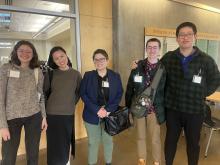by Sarah Levin-Richardson
Building on their experience abroad with the department’s Classics Rome: The Ancient Rome City program, two of our graduating seniors, Meagan White and Amelia Ketzel, will be presenting original research at the upcoming 52nd annual meeting of the Classical Association of the Pacific Northwest (March 15-16). This conference brings together scholars and teachers of Greco-Roman antiquity from Washington, Oregon, British Columbia, and across the U.S. and Canadian West.
Ketzel’s talk “Participatory Art and Object Empowerment: The Complicated Treatment of the Sleeping Hermaphroditus,” builds on her encounter with the famous sculpture in Rome. At its core, Ketzel’s paper explores how formal features, material qualities, and viewing context affect the reception of the sculpture in antiquity and in modern museum contexts. Ketzel argues that Sleeping Hermaphroditus demands participatory viewing, and that the subjectivity of the viewer, in interaction with the sculpture and its viewing context, can produce multiple reactions. If in antiquity and most museum contexts this participatory viewing often leads towards objectifying the sculpture, the sculpture’s display in an exhibit called Vita Dulcis frustrates viewers’ desiring gazes and the participatory nature of the work by the interposition of ten closely spaced pillars with portrait heads that surround Sleeping Hermaphroditus. Amelia summarizes: “Vita Dulcis subverts the normalized treatment of the sculpture in a tricky yet intelligent fashion, addressing the historic sexual objectification the work has suffered and knowingly avoiding it.”
Inspired by a Roman statue of Bacchus with both traditionally masculine and feminine markers, White conducts a close reading of Euripides’s fifth-century BCE tragedy The Bacchae in their talk, “Breaking the Binary: Dionysus and Nonbinary Gender Performance in Antiquity.” White argues that Dionysus can and should be read as gender fluid, not (as previously scholars have interpreted) as revealing his “true” masculine identity by the end of the play. Moreover, the discomfort that this identity creates in his family and home community can be seen in the “gender chaos” that his arrival precipitates. Meagan ends the essay by connecting nonbinary experiences today with this new reading of The Bacchae, noting the resonances that nonbinary readers might have with a story of an individual being kicked out of a family and not welcomed back home.
Both of these talks were originally developed as Senior Essays, the Department’s capstone experience for majors, and were advised by Prof. Levin-Richardson. For other Senior Essays, scroll over to Undergraduate Research. UW Classics graduate students Cat Chase and Haoyang Dai also gave papers at the conference: "The Visual Properties of Water in Statius' Silvae 2.3" and "Enargeia in Livy," respectively.

